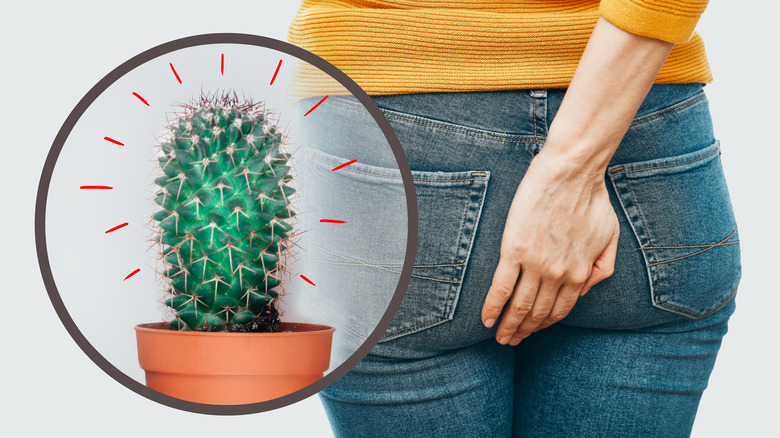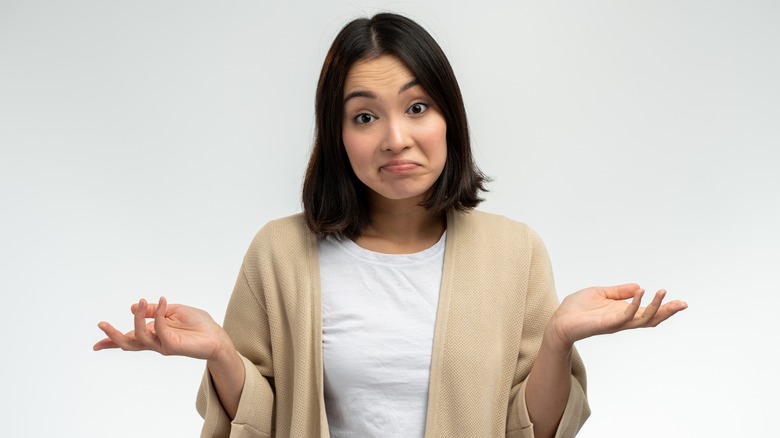Why Do You Get Butt Cramps During Your Period?
During your period, your uterus sheds its endometrial lining, triggering the release of prostaglandins. Prostaglandins are chemicals in the body that act like hormones. They are involved with pain, inflammation, and the contraction and relaxation of smooth muscles (via MedicineNet). The contracting of the uterus as it sheds its lining leads to menstrual cramps, typically occurring in the abdominal and pelvic region. For some, however, cramping occurs in the legs, back, and buttocks (via HelloFlo).
Menstrual cramps occurring in the buttocks are called proctalgia fugax. The pain associated with them is caused by muscles in the rectum and pelvic floor contracting suddenly (via MedicalNewsToday). Cramps in your buttocks and rectum may last from a few seconds to several minutes. Given the pelvic region is made up of a complex network of nerves and muscles, the pain and irritation of one can easily radiate to other parts of the body.
According to a 2013 article published in the Canadian Medical Association Journal, proctalgia fugax impacts between 8% and 18% of the general population. This condition is fleeting, making it difficult for patients to describe the pain to their primary care physician. As a result, they often don't receive further consultation. Causes of proctalgia during menstruation include stress and muscle tension, endometriosis, and constipation (via HealthShots).
What causes butt and rectal cramping?
Bloating and uterine cramps are symptoms of menstrual periods. The resulting inflammation can put pressure on the gluteal muscles, causing tension. Eventually, this leads to spasms in the back and pelvis, cramping in the pelvic region, lower back, and buttocks (via Self). Another culprit of butt cramps is stress. In many cases, people suffering from butt and rectal cramps feel emotional stress prior to their spasms (via WebMD). Given the hormonal changes that occur during menstruation, affecting serotonin and dopamine, it isn't surprising there is a connection between rectal cramps and stress (via Healthline).
Hormonal changes before and during menstruation also contribute to constipation — another cause of rectal cramps. Prior to the start of your period, progesterone levels rise and can slow down your digestive tract, leading to constipation (via Healthline). Prostaglandins are also released, causing the muscles of the uterus to contract and shed its lining, triggering contractions of the bowels and gastrointestinal simultaneously.
Endometriosis is a more serious cause of butt cramps. The Mayo Clinic describes endometriosis as a painful disorder in which endometrial tissue, normally lining the inside of the uterus, grows on other organs within the pelvic cavity. Endometrial tissue can grow on other organs outside of the pelvic cavity, as well. When the body tries to shed endometrial tissue during menstruation, it creates inflammation, triggering the healing process. This causes the formation of endometrial adhesions, binding scar tissue that causes pain and discomfort (via MedicalNewsToday).
Treatment options for butt and rectal cramping
Identifying the cause of these cramps can assist in soothing painful physical symptoms and the accompanying pain-induced emotional stress. Preventative measures to limit bloating and muscle tension are particularly helpful in managing rectal cramps. You can reduce period bloating by limiting caffeine and alcohol intake, eating low-sodium foods, taking a diuretic, and exercising (via Healthline).
Taking a warm bath, and creating a relaxing space for yourself can allow your mind and body to release built-up tension. Taking over-the-counter pain relievers, such as ibuprofen, naproxen, acetaminophen, and aspirin can relieve pain associated with these cramps. Hot and cold compresses can help calm the affected muscles, and reduce pain and inflammation (via WebMD).
Constipation during menstruation can also be improved by dietary changes, minimizing the severity of butt cramps. Ensuring you add additional fiber to your diet before and during your period can reduce the likelihood of experiencing constipation. Beneficial foods include apples, beans, lentils, and whole grains. Staying hydrated helps maintain ideal fluid levels while helping your digestive tract work more efficiently (via Healthline).
If endometriosis is suspected, addressing it with your gynecologist is imperative. Butt cramping that occurs outside of menstruation, painful bowel movements and urination, and excessively painful and heavy periods are symptoms of endometriosis. The Mayo Clinic lists a variety of endometriosis treatment options, both conservative and invasive options. They include pain medication, hormonal therapies, and laparoscopic surgeries. In severe cases, a complete hysterectomy may be required to manage symptoms.



